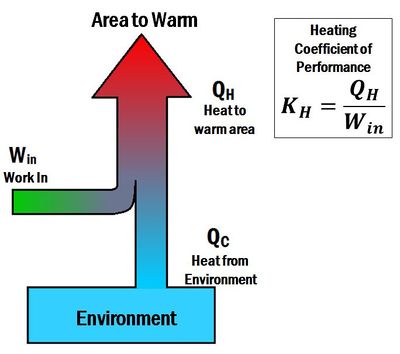The article doesn’t go into it, but a key advantage they have is that heat pumps move heat, rather then trying to generate it. So they can move a lot more heat into your house than would be generated by running the electricity they use through a resistor. This makes them effectively more than 100% efficient (the exact amount depends on temperature) as compared with burning a fuel or resistive heat.



The thing is heat from the outside gets moved inside of the house using a heat pump, and to facilitate this movement you need somewhere between 1/2 and 1/4 of the energy you end up moving. E.g. a heat pump with (coefficient of performance) of 4 would move 4kW of heat into your house and use 1kW of electric energy to accomplish this. Gas by comparison moves 4kW of gas to your house and burns it there to get 4kW of heat.
(coefficient of performance) of 4 would move 4kW of heat into your house and use 1kW of electric energy to accomplish this. Gas by comparison moves 4kW of gas to your house and burns it there to get 4kW of heat.
So you could burn a bit more than 1kW of gas in a modern gas electric plant, turn it into electricity and use it to run a heat pump and you would end up emitting less CO2, the real world grid might skew that worse because generally you don’t end up burning coal to heat housing but you might still use it for electricity. So generally even though it might be unintuitive the more complicated and lossy way to heat your home (the heat pump powered by fossil powered electricity) , is the more effective one compared to burning the same fossil fuel directly because you use the heat pump to capture heat from the environment.